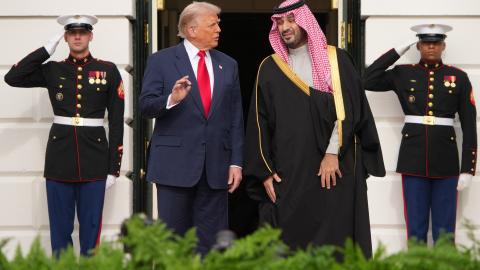Mohammed bin Salman got a royal welcome to Washington this week. President Donald Trump greeted the Saudi crown prince with a horseback procession, a lavish banquet, and even a fighter jet flyover. This pomp did not go over well in Washington, which Bin Salman has not visited since the death of Jamal Khashoggi, a Washington Post columnist and fierce critic of the crown prince. Many Americans see no reason to roll out the red carpet for a ruler on whose hands they see plenty of red already.
The Kingdom of Saudi Arabia and the American republic have usually had a contentious relationship, but events keep forcing this odd couple back together. The two pillars of the relationship—strategic and economic—are now growing wobbly, and Trump is trying to refound them. Although the specific circumstances of the partnership are changing rapidly, the kingdom’s value to Americans remains high.
The Americans and Saudis have had plenty of spats since Franklin D. Roosevelt met King Abdul Aziz Al Saud on Valentine’s Day, 1945, but the two sides have smoothed things over because they ultimately have had too much in common to split up. Neither country wants anyone else to dominate the Middle East, so their strategic thinking is largely aligned. Both sides also wanted to keep oil prices and oil markets stable. For Washington, stable energy markets make the price at the pump acceptable at home and keep the global economy humming. Riyadh wants to keep the price low enough that alternatives are unattractive.
The United States is changing, however. American greens are hellbent on ending the fossil fuel economy, and shale drillers have turned the United States into a net oil exporter. Similar shifts are occurring elsewhere. The increase in global oil supply, and the threat of eventual reduced demand, is forcing the Saudis to diversify their economy and modernize their society.
Bin Salman is forcing his country to lose some flab and rekindle the relationship. Aramco’s huge profits paid for generations of Saudis to enjoy cushy lifestyles, but oil prices are now too low for that to continue and too high to undercut competitors. He is running previously unheard of budget deficits to broaden the Saudi economy. Saudi princes used to need options to invest their money; now, they are trying to convince others to invest in them.
Both sides are worried about the other being wooed away too. Beijing brokered a limited deal between Riyadh and Tehran when the Biden administration pursued détente with Iran, and China still courts Saudi Arabia assiduously. Trump and Bibi set back Iran's regional and nuclear ambitions, but Tehran and its Houthi minions still threaten Saudi security. Turkey is growing more assertive in the region because of Iran's relative weakness, which quietly terrifies the Gulf states.
Trump spotted an opportunity in this economic distress and strategic dilemma. He is wringing nearly $1 trillion in investments from bin Salman—up from the $600 billion promised in May—and promises of collaboration on nuclear power, rare earth minerals, and artificial intelligence. He also inked a defense agreement that allows Riyadh to buy F-35 fighters and tanks. Saudi Arabia is now a "major non-NATO ally," but as Bin Salman knows, Trump is only interested in helping allies who are willing and able to defend themselves. His bear hug is a bit of a squeeze.
Giving Riyadh the silent treatment is a bad bet. Joe Biden mounted a passive-aggressive pressure campaign against Bin Salman. On the campaign trail, he vowed to make the Saudis "the pariah that they are" and said there was "very little social redeeming value in the present government in Saudi Arabia." His administration fingered Bin Salman as directly responsible for Khashoggi's death.
His cold shoulder melted quickly. Russia’s attack on Ukraine roiled global oil markets and sent Biden scurrying to Jeddah for a fist bump that reflected both his distaste for the Saudi crown prince and his inability to do anything about it. This fecklessness accomplished nothing.
The president joked Tuesday, "Trump doesn't give a fist bump" about Biden and his concerns, but there are still ways this renewed partnership could go wrong. Building artificial intelligence centers in proximity to Iran’s shorter-range missile arsenal is a major gamble, as is selling stealth aircraft to a country playing footsie with China. Both are better than Chinese fighter aircraft flying over Chinese data centers on the soil of an American ally.
Many Americans are appalled by Saudi society and dismayed by Trump's scorn for their human rights concerns. That is as true now as it was at the height of World War II. But the clodhopping weakness Biden displayed is far costlier than the allowances made by the great champion of the Four Freedoms and his successors.

















